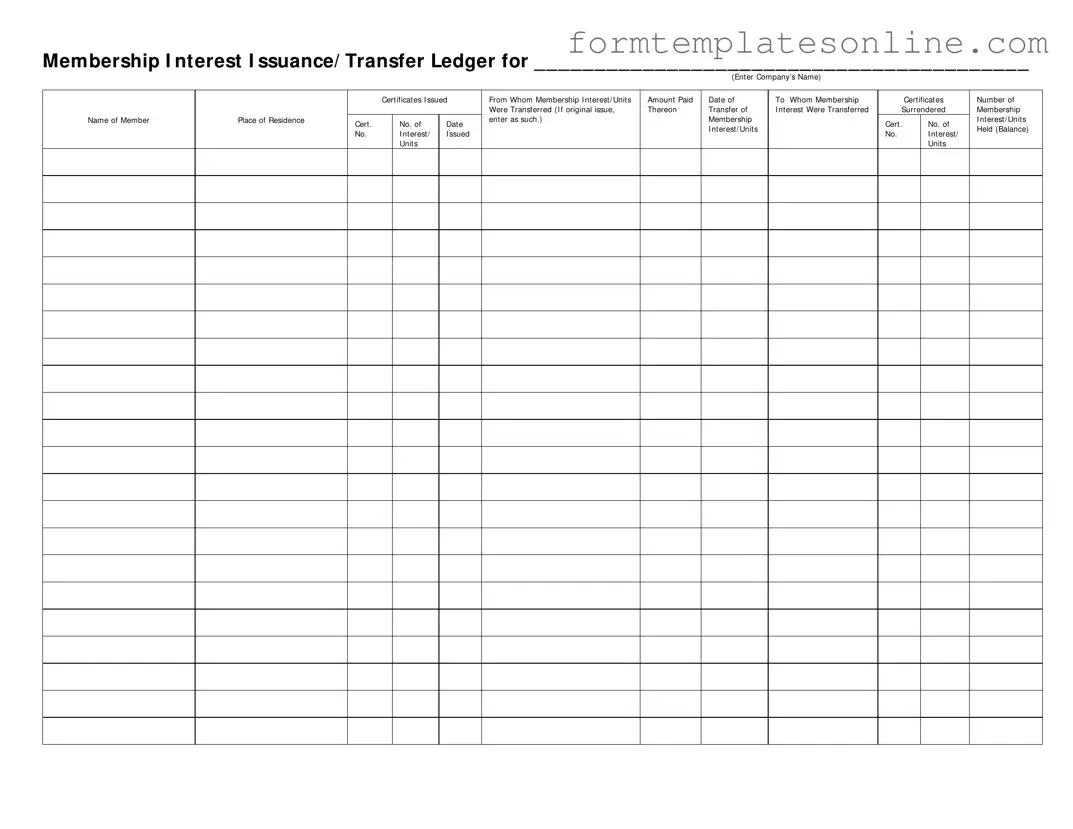Membership Ledger PDF Form
The Membership Ledger form plays a crucial role in tracking the ownership and transfer of membership interests within a company. This form serves as a comprehensive record, detailing essential information such as the company’s name, the certificates issued, and the amounts paid by members. It captures the details of each transaction, including the date of transfer, the names of both the transferor and transferee, and the specific certificates involved. Additionally, the form provides a space for recording the surrender of certificates, ensuring that all changes in membership interests are accurately documented. By maintaining a clear ledger, companies can uphold transparency and accountability, which are vital for fostering trust among members and complying with regulatory requirements.
Common mistakes
-
Failing to enter the company’s name correctly at the top of the form can lead to confusion and processing delays.
-
Omitting the certificates issued section can result in incomplete records, making it difficult to track membership interests.
-
Not specifying the amount paid for each membership interest can create discrepancies in financial records.
-
Forgetting to include the date of transfer can complicate the timeline of membership changes and affect ownership verification.
-
Incorrectly listing the name of the member transferring the interest may lead to legal challenges regarding ownership.
-
Leaving out the place of residence for members can hinder communication and updates regarding membership status.
-
Not indicating the cert. number for transferred interests can result in lost documentation and confusion about membership units.
-
Failing to update the balance of membership interests held can lead to inaccurate records and potential disputes among members.
Example - Membership Ledger Form

Membership I nt erest I ssuance/ Transfer Ledger for _ _ _ _ _ _ _ _ _ _ _ _ _ _ _ _ _ _ _ _ _ _ _ _ _ _ _ _ _ _ _ _ _ _ _ _ _ _ _ _ _
(Enter Company’s Name)
|
|
|
Certificates I ssued |
From Whom Membership I nterest/ Units |
Amount Paid |
Date of |
To Whom Membership |
||
|
|
|
|
|
|
Were Transferred (I f original issue, |
Thereon |
Transfer of |
I nterest Were Transferred |
Name of Member |
Place of Residence |
Cert . |
|
No. of |
Date |
enter as such.) |
|
Membership |
|
|
|
|
|
|
I nterest/ Units |
|
|||
|
|
No. |
|
I nterest/ |
I ssued |
|
|
|
|
|
|
|
|
|
|
|
|||
|
|
|
|
Units |
|
|
|
|
|
|
|
|
|
|
|
|
|
|
|
Certificates
Surrendered
Cert . |
No. of |
No. |
I nterest/ |
|
Units |
|
|
Number of Membership
I nterest/ Units Held (Balance)
More About Membership Ledger
What is the purpose of the Membership Ledger form?
The Membership Ledger form serves as an official record of membership interests issued and transferred within a company. It tracks essential details such as the names of members, the amounts paid for membership interests, and any transfers that occur. This form ensures that all transactions are documented accurately, which is crucial for maintaining transparency and compliance with legal requirements.
What information do I need to fill out the Membership Ledger form?
To complete the Membership Ledger form, you will need specific details including the company's name, the names of members involved in transactions, the amount paid for each membership interest, and the dates of issuance or transfer. Additionally, you will need to provide the certificate numbers associated with the membership interests and the place of residence for each member. This information is vital for ensuring the ledger is comprehensive and accurate.
How do I handle transfers of membership interests on the form?
When recording transfers of membership interests, you should indicate the name of the member transferring the interest and the name of the recipient. Include the certificate numbers of the interests being transferred, along with the date of the transfer. If the interests are being issued for the first time, clearly state that in the appropriate section of the form. This clarity helps maintain an accurate historical record of ownership.
What should I do if a member surrenders their membership interest?
If a member surrenders their membership interest, you must document this on the Membership Ledger form. Record the certificate number of the surrendered interest and note the date of surrender. It is also important to update the balance of membership interests held by the remaining members to reflect this change accurately. This ensures that the ledger remains up-to-date and reflects the current ownership structure.
Is the Membership Ledger form required by law?
Yes, maintaining a Membership Ledger is often a legal requirement for companies, particularly those structured as LLCs or partnerships. This form not only helps in tracking ownership but also plays a critical role in compliance with state regulations. Failure to keep accurate records can lead to legal complications, making it essential to complete and maintain this form diligently.
Key takeaways
When filling out and using the Membership Ledger form, keep the following key takeaways in mind:
- Accuracy is Crucial: Ensure that all information entered, such as the company’s name and member details, is accurate. Mistakes can lead to confusion and potential legal issues.
- Record All Transactions: Every issuance or transfer of membership interests must be documented. This includes the amount paid, date of transfer, and details of both the transferor and transferee.
- Maintain a Clear Balance: Regularly update the ledger to reflect the current number of membership interests held by each member. This helps in tracking ownership accurately.
- Keep It Secure: Store the completed ledger in a safe place. It serves as an important legal document that may be needed for future reference or audits.
Form Attributes
| Fact Name | Description |
|---|---|
| Form Purpose | The Membership Ledger form tracks the issuance and transfer of membership interests in a company. |
| Company Name | Users must enter the name of the company at the beginning of the form. |
| Certificates Issued | The form records details about the certificates issued for membership interests. |
| Transfer Details | It includes information on the transfer of membership interests, such as the date and parties involved. |
| Original Issue | If the interest is being transferred from the original issue, this must be noted on the form. |
| Member Information | The form requires the name and place of residence of the member transferring the interest. |
| Certificate Numbers | Each membership interest has a corresponding certificate number that must be recorded. |
| Surrendered Certificates | Details about any surrendered certificates must also be included in the ledger. |
| Balance of Interests | The form tracks the number of membership interests held by each member after transfers. |
Other PDF Forms
Place of Birth Passport Application - Renewals must be done using a different form, not the DS-11.
To facilitate a smooth transaction, it is recommended that both parties utilize a reliable source for the Georgia Trailer Bill of Sale form, as it can provide essential legal protection and clarity. For more information and resources, visit OnlineLawDocs.com, which offers guidance on completing this important document.
Yugioh Deck List Sheet - Players must fill out all required fields with accuracy and clarity.
Dos and Don'ts
When filling out the Membership Ledger form, it's important to be thorough and accurate. Here are some key dos and don'ts to keep in mind:
- Do enter the company’s name clearly at the top of the form. This helps ensure that all records are properly attributed.
- Do double-check the amounts paid for membership interests or units. Accuracy in this area is crucial for financial records.
- Do include the date of transfer for each membership interest. This provides a clear timeline of ownership.
- Do ensure that all certificates issued are numbered and accounted for. This helps maintain a complete record.
- Don't leave any sections blank. Every part of the form needs to be filled out to avoid confusion later.
- Don't use abbreviations or shorthand that may not be understood by others reviewing the form. Clarity is key.
- Don't forget to verify the place of residence for each member. This information is essential for communication purposes.
- Don't neglect to sign and date the form once completed. This adds authenticity and accountability to the document.
